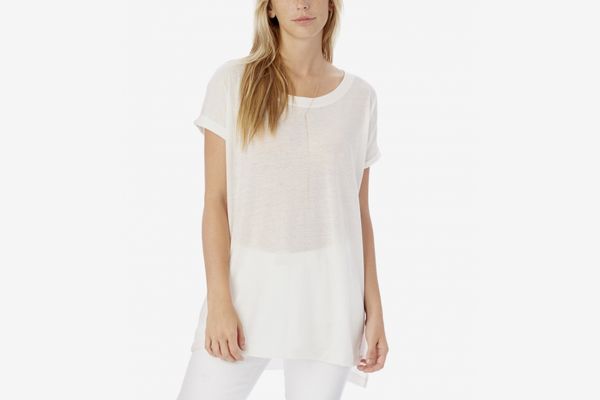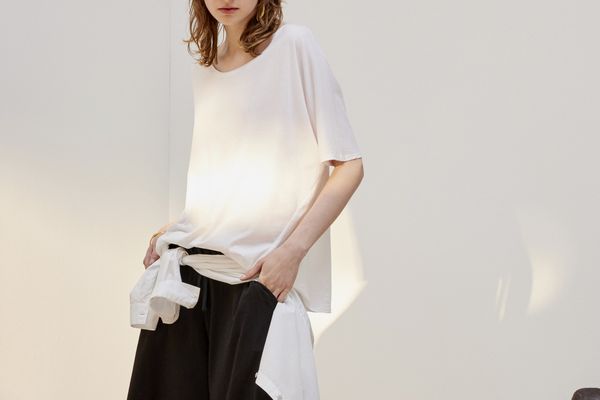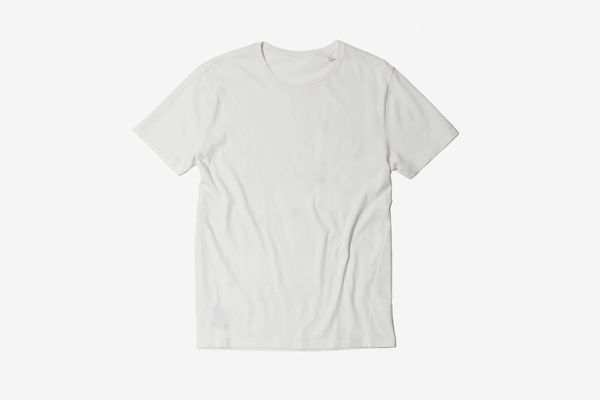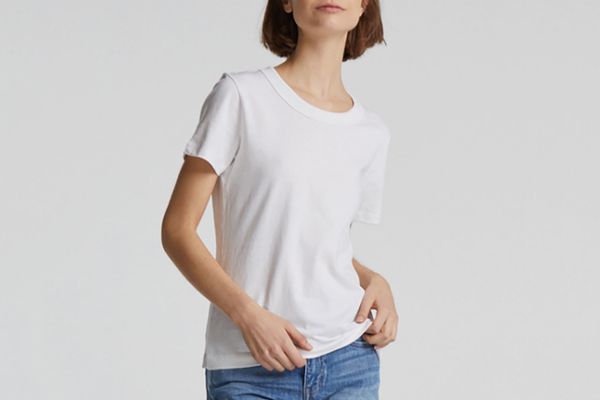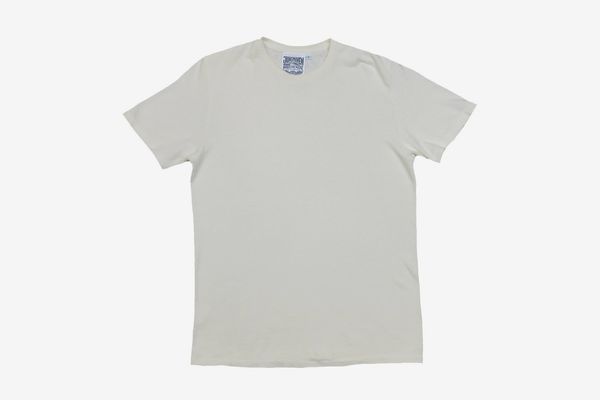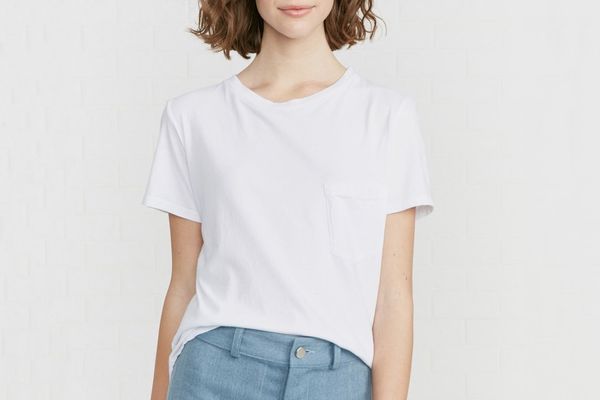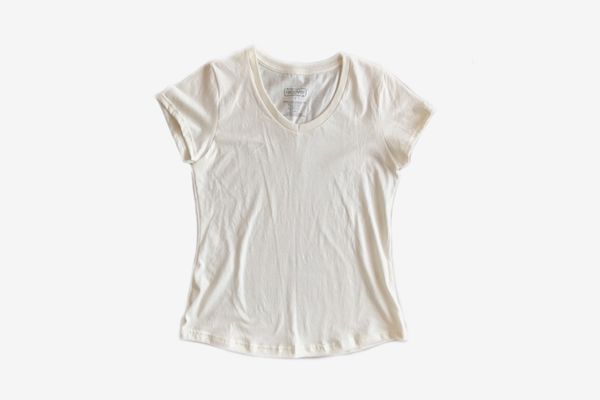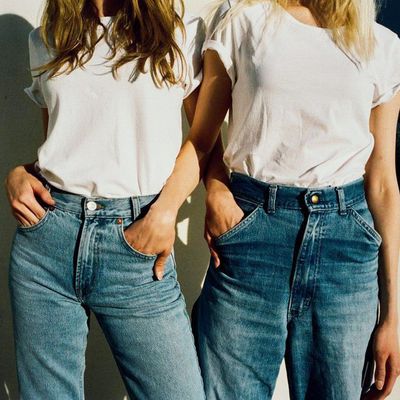
In May, a company with a “closed-loop system” for T-shirts launched. For Days was founded by Kristy Caylor, who created ethical fashion label Maiyet in 2011, to kind of do what Rent the Runway does, but for day-to-day tees. What that means in practice is that For Days will send subscribers either one tee, three tees, six tees, or ten tees, and then, when you’ve finished with them — maybe you stain one, maybe you get tired of them — you can send them back. For Days sends you a brand-new tee and recycles the old one.
All of which is to say that in 2018, buying an ethical, ecofriendly T-shirt is easier than ever. Besides the For Days closed-loop model, there’s Jungmaven (which uses hemp instead of cotton), Alternative Apparel (its shirts are crafted with organic cotton and recycled materials), and Reformation (it makes its garments from rescued dead stock and repurposed vintage), all of which make long-lasting and sustainable shirts that people actually want to wear. To sort through the growing number of ecofriendly options, we asked a group — including journalists, designers, and fashion consultants — to tell us their favorite sustainable T-shirt on the market.
Colleen Coughlin, who teaches classes on sustainability for groups like Debris Free Oceans, likes this slouchy tee from Alternative Apparel. “They do an awesome job of creating ecofriendly, but still fashion-forward apparel,” she says. “They produce 80 percent of their products with sustainable materials and processes. On top of that, their processes include using 60 percent less water on average and completely nontoxic dyes. The company, and the shirt, is pretty rad.”
Kowtow’s tees are made of fair-trade certified organic cotton, and its packaging, from tags to bags, is made from sustainably sourced, recyclable paper. The brand was recommended by two of our experts. “I love this particular oversize tee from Kowtow,” said Elizabeth Stilwell, the creator of sustainable living blog the Note Passer. “It has a perfect slouchy, lived-in look. Plus, I feel good about buying from them: Kowtow uses 100 percent certified fair-trade organic cotton and lists all of its eco-certifications right in the product descriptions. Everything I’ve ever bought from them is well-made, timeless, and still going strong in my closet.” Coughlin agrees. “Kowtow is leading the way for true sustainability,” she said.
“Loomstate is the OG of organic cotton T-shirts,” according to journalist Alden Wicker, who covers fashion and sustainability. “They’ve been organic-cotton advocates since way before it was cool. They focus now on uniforms (last I remember, Chipotle was a customer), but you can still buy yourself a solid basic white tee from their online store. Plus, it’s the most usable and basic, and the cut is flattering. And it’s both 100 percent organic and made in a GOTS (Global Organic Textile Standard International Working Group)-certified factory.”
“I like For Days tees,” says Jasmin Malik Chua, one of the founding editors of fashion site Ecouterre. “They’re made in L.A., and when you’re done with them, For Days will break down the fibers to make yarn for a new batch of shirts, which means it’s a completely closed-loop model.” Plus, she says, she likes the variety in styles. “You can get a never-gets-old classic crew, and a more au courant boxy mid-mock.” Tara St. James, the designer behind environmentally conscious fashion line Study New York, agreed. “My favorite is the white tee, or any tee, really, from For Days,” she said.
Faye Lessler, the founder of Sustaining Life, recommended a simple white tee from Jungmaven. “They’re the best,” she said. “I’ve had mine for over two years, and somehow it’s still white — which never ever happens.” But the thing she loves most, she said, is the fact that the shirt is made of hemp. “The environmental impact of growing hemp versus cotton is huge,” she says. “It requires about a third of the amount of water. It uses significantly less pesticide as well because hemp naturally repels pests, whereas cotton really, really does not.”
Two of our experts recommended Amour Vert. “There are several reasons I love their tees,” said wardrobe stylist and eco-activist Jennifer Rosson. “The first reason is that they’re just extremely high-quality, and if you buy a poorly made, ill-fitting tee just because it’s sustainable and then never wear it, then that’s the opposite of sustainability. Second, the company uses sustainably harvested trees, and for every tee purchased, they plant a tree. Plus, they’re made here in the USA.” Lauren Faye, who works at Fashion Revolution, a company that campaigns for systemic reform of the fashion industry, agrees. “Plus, they’re inexpensive,” she said. “Which is always good.”
Sustainable fashion advocate Shannon Lohr thinks the most sustainable white tee on the market is by Recover Brands. “They reclaimed scraps from discarded clothing and combine them with discarded plastic bottles to create a yarn that is completely recycled. Most importantly, the process is nearly entirely waterless and does not require any chemicals. That is almost unheard of in the apparel industry. I believe this to be the most sustainable T-shirt on the market because it makes use of materials that would otherwise be sitting in a landfill, it doesn’t require the use of any new materials, it’s nearly waterless, and it’s chemical-free.”
The Strategist is designed to surface the most useful, expert recommendations for things to buy across the vast e-commerce landscape. Some of our latest conquests include the best acne treatments, rolling luggage, pillows for side sleepers, natural anxiety remedies, and bath towels. We update links when possible, but note that deals can expire and all prices are subject to change.
Every editorial product is independently selected. If you buy something through our links, New York may earn an affiliate commission.
